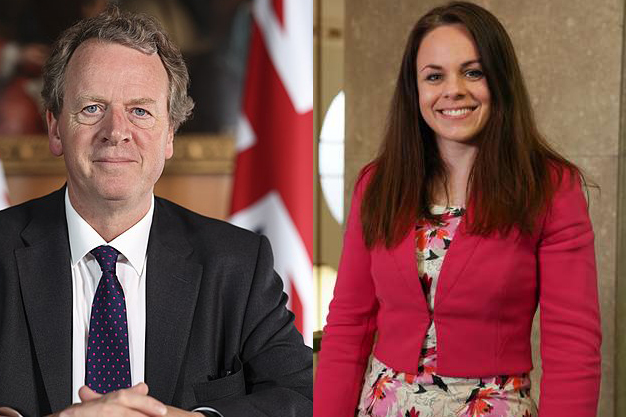
OPPOSITION to the Scottish Government’s flagship Deposit Return Scheme may be reaching a tipping point, as more politicians both within and without the Scottish Government publicly suggest that it cannot go ahead in its current form.
ScotGov Finance Secretary Kate Forbes, who is reportedly the SNP membership’s favourite to fill Nicola Sturgeon’s First Ministerial shoes, today declared that the recycling initiative was a “good idea badly executed”, and should not be implemented as planned in August.
“The deposit return scheme is a great initiative but at the moment its execution is causing huge concern to countless local businesses,” said Mrs Forbes, who pointedly chose the Cairngorm brewery in Aviemore as the venue for her leadership campaign’s economic policy launch.
Warning of economic ‘carnage’ if the scheme proceeded, she stressed that small businesses could not help drive growth while reeling from yet more extra costs.
“We need to give them some breathing space after Covid, the cost of living crisis and Brexit,” she said, promising a ‘reset ‘of the relationship between business and government.
Another SNP leadership contender, Humza Yousaf, went on the record to say that, at the very least, he would exclude small businesses from the first year of the scheme: “It’s not the craft breweries or the craft gin makers causing the issue, it’s the big producers that we should be targeting,” he said.
The third candidate, Ash Regan, has also said she would delay the scheme because of the business community’s concerns.
But perhaps the biggest political blow to the DRS has come from outwith the Scottish Government, with the intervention of Scottish Secretary of State Alister Jack, who has suggested that Westminster may have the final say on whether or not the scheme will proceed.
The embattled Scottish Greens minister in charge of implementing the DRS, Lorna Slater, has not yet secured the exemption from the UK Internal Market Act that is needed for the scheme to proceed.
England has its own DRS coming – in October 2025 – and Mr Jack has called for a ‘united’ approach to the roll-out, suggesting that the Scottish version of the scheme ran counter to Westminster’s attempts to limit inflation.
“Aldi will sell 12 bottles of Scottish water for £1.59. Under this scheme, that will become £3.99,” said Mr Jack.
“If that is not inflationary, if that is not adding to people’s cost of living, I do not know what is.”
Since Mr Jack spoke up on the matter, a UK Government spokesperson has clarified: “The Scottish secretary has urged the Scottish Government to pause its scheme and work with the UK Government on a solution that works for both Scotland and the whole of the UK. That would be the best way to maximise environmental benefits, minimise disruption to the drinks industry and ensure choice for consumers.”
The first crack in the political foundations of DRS came early in February, when SNP party veteran Fergus Ewing used First Minister’s Questions at Holyrood to call for a halt to this ‘disaster of a scheme’.
“Unless it is halted now, the scheme – most businesses believe it to be fatally flawed – will damage Scotland’s reputation as a place to do business,” said Mr Ewing. Mere days after his intervention, Ms Sturgeon dropped the bombshell of her resignation.
But as things stand right at this moment, Ms Slater is still Minister for Green Skills, Circular Economy and Biodiversity, and is insisting that Scotland’s DRS will go ahead on its scheduled start date of August 16 this year, whereafter businesses will be required to pay a 20p deposit for each single-use container made from plastic, glass, steel or aluminium, sized between 50ml and three litres, that they buy from their supplier, with that 20p deposit then refunded by the scheme administrator when the container is collected.
However, Ms Slater has raised the possibility of a ‘grace period’ to allow small producers to ease into the scheme – and idea arising from her conversations with businesses about their concerns ahead of the DRS sign-up deadline on February 28.
Ms Slater said: “There are two things in line here – one is signing up with the scheme administrator and the deadline for that is Tuesday. That is the registration process.
“In terms of actively getting their product on the shelf and make sure the labelling is right and so forth, we will then work with small producers going forward to bring them into the scheme in a pragmatic way that works for them. That’s two different deadlines.”
Now that the wider political world has woken up to problems of the DRS, industry lobbyists are indulging in a well-earned bout of ‘I told you so”, as the hospitality sector has been warning for years that the scheme is not fit-for-purpose.
UKHospitality Scotland executive director Leon Thompson said: “Finally, common sense is prevailing in Holyrood as the complexity and devastating impact of the Deposit Return Scheme becomes glaringly evident.
“The flawed model, complexity and burdens of the scheme will put unnecessary pressure on both businesses and consumers, who are all struggling with the cost-of-living crisis.
“These cast-iron facts, alongside concerns around how it could impact trading with the rest of the UK, necessitate an immediate halt to the scheme’s introduction and I am calling on all leadership candidates to commit to pausing and then ordering a full review of this now discredited scheme.
“With all nations in the UK planning to introduce a Deposit Return Scheme, we need to see a UK-wide scheme that works for businesses and consumers, as well as all our sustainability and net zero goals,” said Mr Thompson.
“Hospitality businesses are not against a scheme, but they want one that takes account of the excellent rates of recycling across our sector and targets resources where DRS can make a difference to littering and sustainability targets. The current iteration does none of that which is why a full review is now essential.”




















